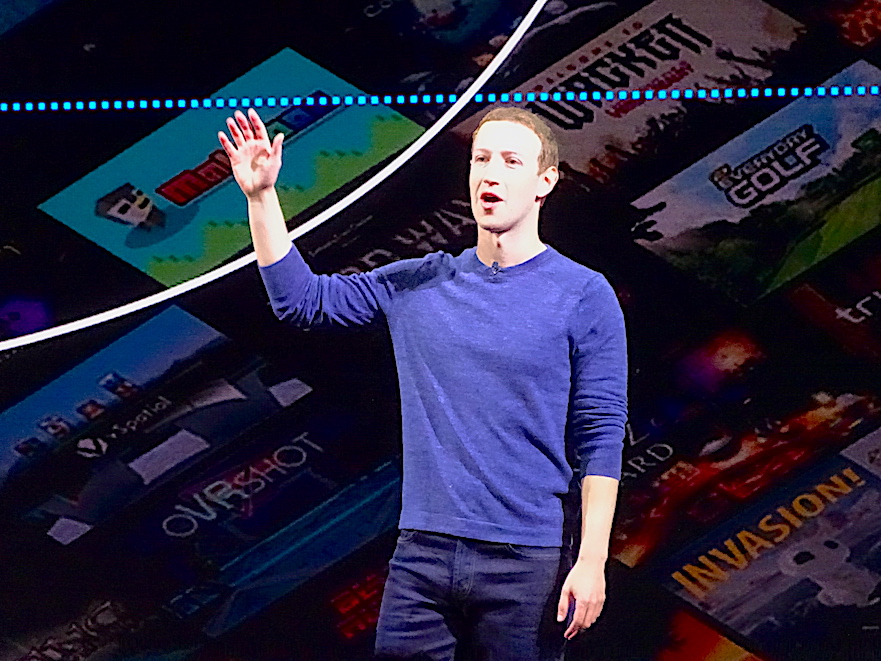 APPS
APPS
 APPS
APPS
 APPS
APPS
Benefiting from the easing of the COVID-19 pandemic, Facebook Inc. today reported its first-quarter profit nearly doubled on much better-than-expected revenue.
The social networking giant, which also counts Messenger, WhatsApp and Instagram among its properties, said it earned a first-quarter profit of $9.5 billion, or $3.30 a share, up 94% from a year ago. Revenue jumped 46%, to $25.4 billion.
Analysts had forecast Facebook would earn a profit of $2.37 a share on revenue of $23.7 billion.
Like Alphabet Inc., which reported a big upside earnings surprise on Tuesday, Facebook benefited this past quarter from lapping a sharp downturn in ad spending a year ago in the thick of the early pandemic. That benefit could continue into the second quarter, but Chief Financial Officer David Wehner has said the second half is likely to see a slowdown thanks to ad spending rebounding in 2020’s second half.
Facebook shares were rising more than 5% in early after-hours trading after the earnings release. In regular todaying today, they closed up about 1.2%, to $307.10 a share. The stock has risen nearly 50% in the last year.
In a conference call with analysts, Chief Executive Mark Zuckerberg (pictured) said the company plans to keep pouring on the gas, especially in areas beyond advertising that constitutes nearly all its revenue currently. “Our business has been performing better than we expected in the last couple of quarters,” he said. That’s prompting the company to invest more in some areas: augmented and virtual reality, which Zuckerberg views as the next computing platform, commerce, business messaging and creators.
Facebook also reported daily active users of 1.88 billion, slightly above analysts’ average forecast of 1.89 billion, according to FactSet. Monthly active users came in at 2.85 billion, just a hair below analysts’ 2.86 billion estimate. Zuckerberg added that more than 2.7 billion people use one of its apps daily.
Wehner said advertising revenue was driven by a 30% increase in the average price of an ad from a year ago, as well as a 12% increase in the number of ads served.
“After Snap reported strong earnings last week and Google reported big wins yesterday, it’s no surprise to see Facebook’s revenues skyrocket thanks to huge ad investments from brands,” said President and Chief of Strategy Yuval Ben-Itzhak, president and chief of strategy at social media marketing firm Socialbakers. “After a year of pandemic-related spending cuts and bounce-backs, it’s encouraging to see steady investment in ads across Facebook’s platforms.”
Ben-Itzhak said Socialbakers’ most recent data found that global ad spend on social media jumped 60% from a year ago, while Instagram’s audience grew 10%. “One thing that doesn’t look set to change anytime soon is that Facebook remains the most reliable place for brands to be seen and heard,” he said.
Wehner provided considerable guidance, saying that ad growth would be driven mostly by price for the rest of this year.
“We expect second quarter 2021 year-over-year total revenue growth to remain stable or modestly accelerate relative to the growth rate in the first quarter of 2021 as we lap slower growth related to the pandemic during the second quarter of 2020,” he said in prepared remarks. “In the third and fourth quarters of 2021, we expect year-over-year total revenue growth rates to significantly decelerate sequentially as we lap periods of increasingly strong growth.”
In addition, he said, “we continue to expect increased ad targeting headwinds in 2021 from regulatory and platform changes, notably the recently-launched iOS 14.5 update, which we expect to begin having an impact in the second quarter. There is also continuing uncertainty around the viability of transatlantic data transfers in light of recent European regulatory developments, and like companies across a wide range of industries, we are closely monitoring the potential impact on our European operations as these developments progress.”
As for expenses, Wehner said he expects them to total $70 billion to $73 billion this year, more than its prior outlook of $68 billion to $73 billion. That will be driven by new hires, infrastructure and the costs of its consumer hardware such as its Oculus virtual reality headsets. Facebook is expecting capital spending to be $19 billion to $21 billion, down from its previous estimate of $21 billion to $23 billion.
This year likely will bring more challenges to the company. “Other looming threats to Facebook’s business, such as Apple’s app tracking ID being introduced with iOS 14 and increasing regulatory pressure in multiple countries, have not become material yet but may have a larger impact in the second half of 2021,” said Martin Garner, chief operating officer of market research firm CCS Insight.
“Now, users will likely see less relevant ads, meaning brands could see weaker return on investment,” Ben-Itzhak added. “But this isn’t a death knell for Facebook’s ad revenues. If it can overcome this hurdle – perhaps by giving users more control over the content they want to see – both brands and consumers will benefit, not to mention Facebook itself.”
Support our mission to keep content open and free by engaging with theCUBE community. Join theCUBE’s Alumni Trust Network, where technology leaders connect, share intelligence and create opportunities.
Founded by tech visionaries John Furrier and Dave Vellante, SiliconANGLE Media has built a dynamic ecosystem of industry-leading digital media brands that reach 15+ million elite tech professionals. Our new proprietary theCUBE AI Video Cloud is breaking ground in audience interaction, leveraging theCUBEai.com neural network to help technology companies make data-driven decisions and stay at the forefront of industry conversations.